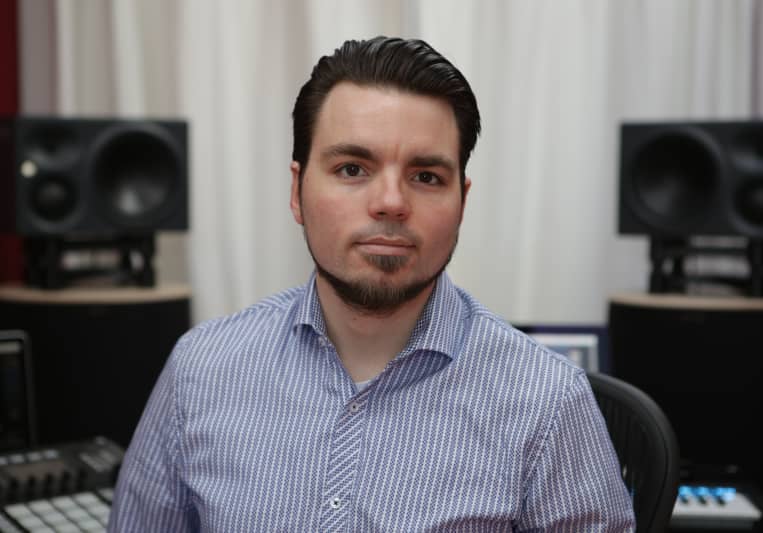
Audio Engineer and Beatmaker who has worked with artists from France, Germany, the US, the UK and the Caribbean.
I propose mixing services, and I compose beats. I specialise in Urban music genres as well as in Caribbean music.
I'd love to hear about your project. Click the 'Contact' button above to get in touch.
Interview with Leander 'Troove' Neumann
Q: Tell us about a project you worked on you are especially proud of and why. What was your role?
A: Recording a gospel choir for the album of Yohan Freget. One of my first jobs as a free-lancer for a major label and I'm very happy with the sound I got out of the recordings.
Q: What are you working on at the moment?
A: Mixes for different french rap artists.
Q: Analog or digital and why?
A: Both, digital for precision and instant recall, analogue for color and warmth.
Q: What's your 'promise' to your clients?
A: I'll try my best to make your mix reach it's fullest potential.
Q: What do you like most about your job?
A: Working on great sounding music and enhancing the emotions the music trys to convey.
Q: What questions do customers most commonly ask you? What's your answer?
A: Can you make it louder? Sure, but keep in mind that the mix might suffer from too much limiting, that it might fatigue the listeners and will most likely automatically turned down by the loudness processing on streaming plattforms these days.
Q: What's the biggest misconception about what you do?
A: That you can fix everthing in the mix. Bad recordings can only be improved to a certain amount in the mix.
Q: What questions do you ask prospective clients?
A: What do you already like about the song, what do you want to improve on?
Q: What advice do you have for a customer looking to hire a provider like you?
A: Have a clear vision where you want to go with your project. A rough mix thats close to what you want the finished song to sound like or some reference tracks can be really helpful for me to better understand your sonic goals.
Q: If you were on a desert island and could take just 5 pieces of gear, what would they be?
A: A Computer with Protools. An audio interface. A pair of good reference monitors. A pair of headphones. A midi keyboard.
Q: What was your career path? How long have you been doing this?
A: I have started playing the piano at a young age, then fell in love with hip-hop and started making beats. I started to help out in different local studios and then enrolled in the SAE audio engineering program in Paris. After I completed the program, I started to work as an assistant engineer. Since 2013 I work as a free-lance engineer.
Q: How would you describe your style?
A: I like mixes that have a fair amount of bottom end and that groove..
Q: Which artist would you like to work with and why?
A: Any artist that is authentic and puts all of his emotion into his music. Then half of the work is already done and it's a pure pleasure to work out the little nuances to enhance the emotion and make the audience love the song.
Q: Can you share one music production tip?
A: Use references when mixing to see where you're at in comparaison to the competition and to regain perspective.
Q: What type of music do you usually work on?
A: Mostly 'urban' music genres Hip-Hop, R&B, Rap etc. as well as caribbean music (Reggae, DanceHall, Zouk etc.)
Q: What's your strongest skill?
A: My broad knowledge of different music styles and production techniques.
Q: What do you bring to a song?
A: My set of ears and a fresh perspective on the song.
Q: What's your typical work process?
A: It all starts with listening attentively to the projet and a rough mix if provided to determine the artists intention and direction for the project. Then I take notes and listen again to see what is already good and what needs to be fixed / optimised. I then go from there to start mixing until everything sounds fine to me before sending the file to the client to get his feedback and see if there are things that the client wants modified.
Q: Tell us about your studio setup.
A: I have a hybrid setup. Most of the mixing is done in the box, but then the summing stage is analogue with stems summing in my Dangerous D-Box and then going through my Tegeler Audio Bus Compressor and EQ before going back into protools.
Q: What other musicians or music production professionals inspire you?
A: Serban Ghenea for mixing. Dave Pensado for sharing his experience and tricks. Chris Gehringer for mastering. Max Martin for production.
Q: Describe the most common type of work you do for your clients.
A: I would say about 60 to 70 % of my working time is spend mixing projects for clients and the rest of the time I compose beats for artists and sound libraries.

- Mixing EngineerAverage price - $200 per song
- Mastering EngineerAverage price - $50 per song
- Beat MakerAverage price - $150 per song
- Full instrumental productionAverage price - $250 per song
- Dangerous D-Box
- Bloo La2a
- Tegeler Audio Creme
- Peluso 2247SE
- Neve 1073 DPD



